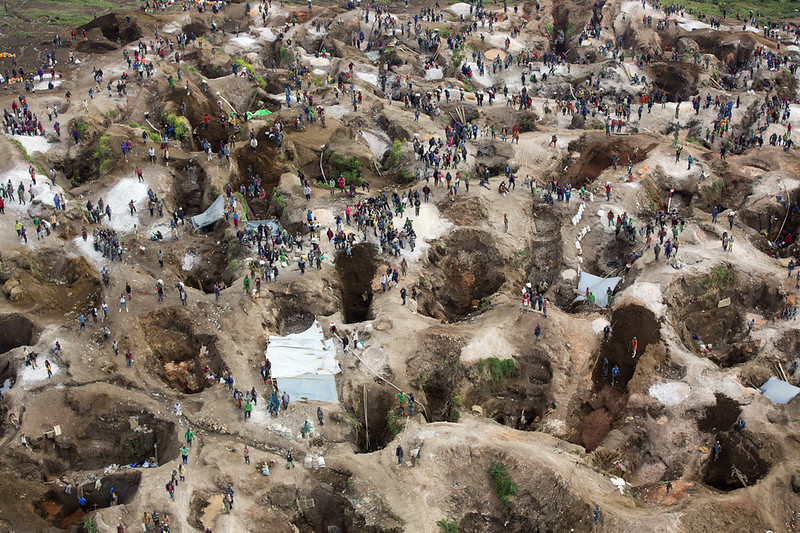What The Fact?
SRSG visits Coltan mine in Rubaya in 2014 by MONUSCO Photos/Sylvain Liechti via Flickr (CC BY-SA 2.0)
The Claim
The climate crisis and environmental concerns have probably never been as present in the public consciousness as they are now. The mixed outcomes of COP28 have been heralded as ‘historic’ by some, and ‘devastating’ by others. What is for certain is that much more needs to be done to ensure temperatures do not rise by 2 degrees Celsius, and prevent a total climate collapse. People are looking for a solution. Elon Musk is one man who claims to have just that.
In July 2023, Elon Musk tweeted the following:
‘Lithium batteries are the new oil.’
Lithium batteries, otherwise known as lithium-ion batteries, are what power mobile phones, computers, and electric vehicles, and have grown in popularity exponentially since they were first introduced. In his claim, Musk is referring to lithium batteries being the ultimate alternative to oil as the essential energy source of a cleaner, greener future.
There is little doubt that shifting from regular combustion engines (which use petroleum or diesel) to electric-powered engines (which don’t directly use fossil fuels to power them*) is essential to ensure a just transition to a cleaner, renewable energy future. Musk’s claim however goes a step further than that, and claims that lithium batteries are essentially a direct replacement for oil, which until recently, has powered the vast majority of power for the last 200 years.
So, is the claim by Elon Musk accurate, and are lithium batteries truly the answer to the world’s problems?
The Verdict

The claim is rated misleading based on the best evidence publicly available at this time.
*While electric-powered engines don’t use fuel or other fossil fuels to power them, the electricity used to charge them may use fossil fuels. For example, just 36.8% of electricity in Ireland is generated using renewable energy. This figure is improving, but as of 2024, the majority of electricity in Ireland is still generated using non-renewable forms of energy.
The Evidence
Lithium batteries are, and will be, an absolutely crucial component to how the world works for decades, and maybe even centuries, to come. Not only do they not directly use fossil fuels to run, they can also be reused and recycled, unlike oil, or fossil fuels more generally. But to say they are a replacement for oil without any further context is quite misleading.
‘ The blood diamonds of electric cars ’
Firstly, it is important to note that lithium batteries do not just contain lithium, but also other rare earth metals such as cobalt, nickel and manganese. While seemingly innocuous, the relative silence by Musk on the issues which arise from this is dangerous and irresponsible.
The mining of these metals, particularly cobalt, has brought untold suffering to countless people in places such as the Democratic Republic of Congo (DRC). According to the Financial Times, in 2022 the DRC was responsible for 73% of cobalt worldwide, but with horrific human rights abuses and terrible working conditions. Despite reforms, child labour is still widespread, and organisations such as Amnesty International and Walk Free, and academics from Harvard University and the University of Birmingham, have called worker’s conditions ‘modern-day slavery’. Treacherous working conditions mean workplace accidents are commonplace, while workers work long hours for extremely low wages, with little food and few rights or protection.
Pierre is just one of these workers. His wage is just €3 a day, and he works 12 hours a day.
“The salary is very, very small. It gives me a headache…The mine makes so much and we make so little.”
He can earn slightly more if he does not take lunch, which consists of two small bread rolls and a carton of juice. If he is sick and misses more than two days a month, money is deducted from his wages.
“You can’t even argue. If you do, you’ll be fired. The relationship between us and the [mine] is like a slave and a master.”
Pierre’s story is just one of millions, but it has meant that cobalt has been referred to as ‘the blood diamond of electric cars.’
Disposal
The disposal of used batteries is another major issue which needs to be addressed. Some estimates suggest there will be 12 million tons of lithium-ion batteries that will be retired by 2030. As of 2023, it is estimated just 5% of them are recycled. Unfortunately, the recycling process of lithium batteries is extremely complex, costly and can be dangerous if not done correctly. Batteries which are not recycled go to landfill, where they can cause fires, release toxins into soils and water sources, as well as cause air pollution.
Improving the scale and efficiency of battery recycling is paramount to the green transition. This would both deal with the issues of disposal, as well as lower the demand of dangerous mineral mining, which often also sees human rights abuses. A report by Earthworks showed that “effectively recycling end-of-life batteries could reduce global EV mineral demand 55% for newly mined copper, 25% for lithium and 35% for cobalt and nickel by 2040.”
As with any claim, one should also look at the source. Elon Musk is the billionaire CEO of Tesla, the largest producer of electric vehicles in the world. Once one is aware of this, it should come as no surprise that Musk is happy to highlight the positives of lithium batteries, while seemingly downplaying issues associated with them, such as ‘modern-day slavery’ and a lack of disposal infrastructure. It should be noted, however, that Tesla has invested heavily in recycling plants and technology to improve the process, but it is still far from perfect. On mining and human rights issues, Tesla, however, is a laggard. They buy considerable amounts of cobalt and nickel from mining company Glencore. Glencore has had at least 70 allegations of human rights abuses against it since 2010, and have even pleaded guilty to ‘foreign bribery’. Some of these allegations come from a mine in the DRC, where Tesla had a deal in place to purchase a quarter of the cobalt that mine produces.
Tesla and Glencore say they are committed to human rights, but Glencore have topped the list for most allegations of human rights abuses in 2022 and 2023.
Conclusion
Undoubtedly, lithium batteries are here to stay, and they are highly beneficial to the energy transition and avoiding the worst impacts of climate change. They may even be just as integral to the global system as oil in the future, but must understand the broader implications of their use, and what we can do to make sure they are a real solution to the climate crisis, rather than one which also exacerbates other problems.
It is vital we do not turn a blind eye to issues which arise from their production. Modern day slavery is real, and more must be done to ensure the mining of lithium, and particularly cobalt and nickel, are done in a way that benefits local communities that have large mineral deposits, rather than disenfranchise or exploit them. Furthermore, disposal of lithium batteries is still a major problem which we have yet to find an effective, practical solution to.
Verdict
Based on the ‘What the Fact?’ scales guide, and the significant amount of evidence outlined above, the claim made by Elon Musk is Misleading.
Elements of the claim are accurate, but presented in a way that is misleading – based on the best evidence publicly available at this time.
- Kai Evans is a masters graduate in International Development, and a contributing writer with developmenteducation.ie
developmenteducation.ie’s What The Fact? supports the code of principles of the International Fact Checking Network. We check claims by influencers, from local to national to transnational that relate to human rights and international human development.
Transparent fact checking is a powerful instrument of accountability, and we need your help. Send tips and ideas to facts@developmenteducation.ie
Join the conversation #whatDEfact on Twitter @DevEdIreland, Facebook @DevEdIreland and Instagram @developmenteducation.ie
More on developmenteducation.ie

Beth Doherty: Youth Activism and the Climate Crisis
From School Strikes to Global Climate Talks The latest episode of the Irish Global Solidarity in 100 Objects podcast features Beth Doherty, climate activist and

Mary Lawlor: Defending Human Rights Defenders
A Conversation with the UN Special Rapporteur for Human Rights Defenders The latest episode of the Irish Global Solidarity in 100 Objects podcast features Mary

Irish Women in Activism and Advocacy: In Awe of All Mná
Explore inspiring stories of Irish women in activism and advocacy who have fought for human rights, social justice, and equality at home and abroad

Call for resource submissions open – education resources during an era of climate promises, disinformation and pandemics
Submit or recommend resources to be included in the Ireland-wide audit of development education and global citizenship education resources.

Podcast: If Another World Is Possible, It Is Up to Us to Make It So
A Reflection on Palestinian Solidarity and Collective Action In this episode of the Irish Global Solidarity in 100 Objects podcast, Ciara Regan revisits her 2021

Podcast: Exploring Global Citizenship with a Ball of String
The Power of Simple Tools in Teaching Global Citizenship Sometimes, the most impactful lessons come from the simplest tools. In this episode of the Irish

